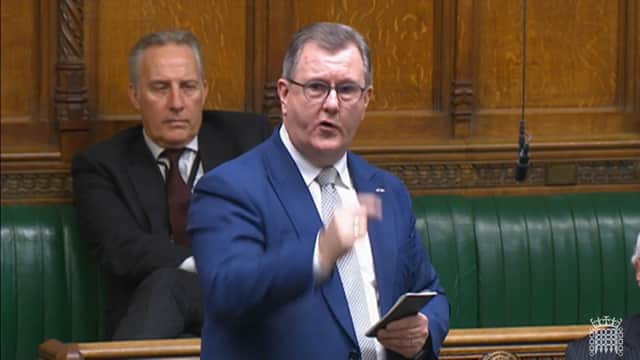Ben Lowry: Fellow unionists were hardly the best target for Sir Jeffrey in his emotional Westminster speech


I want to look at another neglected aspect of the DUP leader's emotional speech on January 24 in the House of Commons, which provoked a wave of sympathy for him.
We report on page 7 about the aftermath of the police finding that there was nothing further to do about Sir Jeffrey's complaint. (Click here: ‘He should not run away from a story that he has created': Calls for details from Sir Jeffrey Donaldson over the threat made against him after police detect 'no offences')
Advertisement
Hide AdAdvertisement
Hide AdSir Jeffrey had said in his speech that one of the people who threatened him had not voted. This then led to the TUV pointing out, just after the speech, that if the person carrying out the threat was known, there needed to be a swift police investigation. The following day, January 25, the DUP said it had been reported.
• Keep scrolling down to read more (click here to read Ben Lowry on how the DUP turned on Jim Allister the day Sinn Fein took first minister of NI)
There has been much focus this week on the fact that Sir Jeffrey said that "a decision was made not to press charges". But that raises the question of by whom? And how can you press charges if no offence was carried out?
He also said: "Those who made the threats now know they are not beyond the reach of the law.” But this implies that someone who has not committed an offence is within the reach of the law.
Advertisement
Hide AdAdvertisement
Hide AdEven so, I want to focus on two other aspects of the speech.
First, it confirmed that Sir Jeffrey was determined to return to Stormont, something that had in fact been made clear in his October speech to the DUP when he said devolution was "essential" to Northern Ireland's place in the UK.
He also confirmed his determination to return in a letter to us on November 1 complaining about one of our editorials. We had actually said the DUP staying out had secured gain, but added: "Unionist options are poor but if a government paper pledge leads to a return, few unionists will believe there has been a real victory." (Click here to read that editorial)
Sir Jeffrey wrote: "It is a long time since I have read such a defeatist and negative editorial. Support for the Union was at its highest in Northern Ireland when we had fully functioning devolution." (Click here to read it: The News Letter might concede defeat, but we in the DUP will not do so)
Advertisement
Hide AdAdvertisement
Hide AdWhile the DUP says it was still negotiating with London as recently as last month, it had let the UK government know months ago in both the conference speech and the letter to us that it saw no option other than a return to Stormont. This hardly strengthens your negotiating position thereafter.
But the other aspect of the speech that has been neglected is this.
Sir Jeffrey was withering about his unionist critics, and asked what they had achieved, something he has asked since.
Setting aside the possibility that unionists like Jim Allister’s unwavering opposition to the Irish Sea border in fact moved the DUP away from its initial pragmatic response to the NI protocol in 2021, there is another point to be made. Are fellow unionists the people that Sir Jeffrey should have been attacking in such impassioned terms?
Advertisement
Hide AdAdvertisement
Hide AdUnionist opposition to the Irish Sea border has in fact been restrained. There has been almost no embrace of thuggery or violence, thank goodness. Yes individuals have engaged in outrageous commentary or intimidating conduct, but very few.
On the other hand, nationalists and others scolded, mocked, pressured the DUP. There was the implied threat of the removal of minority protections for unionists. The party was criticised by American leaders, Irish ones, Tories, Labour, EU leaders, all the main parties, including the Ulster Unionists.
The DUP were repeatedly isolated and belittled in media broadcast debates with one-sided panels. In more than one show I was the only person to defend them amidst multiple commentators – not because I support the DUP but because I was trying to explain their important opposition to something as serious as an internal UK border. They were even criticised by business leaders, who almost to a person demanded a return to Stormont, and who barely ever prioritised in their concerns our most important trade, that within the UK.
After such relentless and punishing pressure for two years Sir Jeffrey's most emphatic attack in the House of Commons that day was for unionist critics who have, overwhelmingly, been moderate.
Advertisement
Hide AdAdvertisement
Hide AdAnd there is another aspect to the two years of criticism: almost no such criticism was levelled at Sinn Fein which after 2017 was allowed to keep Stormont down for three years until it got its non negotiable demand of an Irish language act. Quickly the media commentary moved to criticism of 'both sides' rather than SF.
Indeed Julian Smith, the worst Tory secretary of state for unionism since 2010, in fact that is being kind to him because I cannot think of a Labour NI secretary pre 2010 who did such harm to our position, actually singled out for criticism the DUP near the end of that long republican collapse. He certainly didn’t dare to criticise SF, who certainly weren't threatened with constitutional change against nationalists.
The double standards were stark. Perhaps Sir Jeffrey will give us a speech on that.
• Ben Lowry (@BenLowry2) is News Letter editor